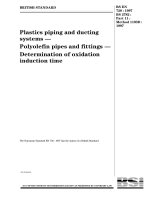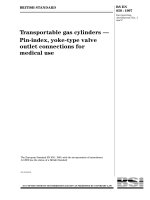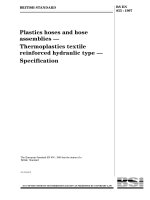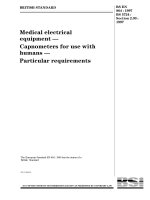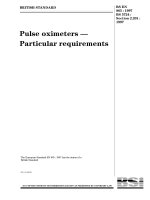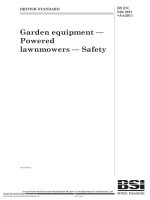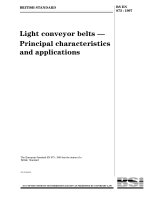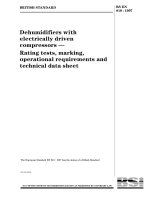Bsi bs en 00855 1997
Bạn đang xem bản rút gọn của tài liệu. Xem và tải ngay bản đầy đủ của tài liệu tại đây (133.67 KB, 12 trang )
BRITISH STANDARD
Plastics hoses and hose
assemblies Ð
Thermoplastics textile
reinforced hydraulic type Ð
Specification
The European Standard EN 855 : 1996 has the status of a
British Standard
ICS 23.040.70
NO COPYING WITHOUT BSI PERMISSION EXCEPT AS PERMITTED BY COPYRIGHT LAW
|
|
|
|
|
|
|
|
|
|
|
|
|
|
|
|
|
|
|
|
|
|
|
|
|
|
|
|
|
|
|
|
|
|
|
|
|
|
|
|
|
|
|
|
|
|
|
|
|
|
|
|
|
|
|
|
|
|
|
|
|
|
|
|
|
|
|
|
|
|
|
|
|
|
|
|
|
|
|
|
|
|
|
|
|
|
|
|
|
|
|
|
|
|
|
|
|
|
|
|
|
|
|
|
|
|
|
|
|
|
|
|
|
|
|
|
|
|
|
|
|
|
|
|
|
|
|
|
|
BS EN
855 : 1997
BS EN 855 : 1997
Committees responsible for this
British Standard
The preparation of this British Standard was entrusted to Technical Committee
PRI/66, Rubber and plastics tubing, hoses and hose assemblies, upon which the
following bodies were represented:
Association of Metropolitan Authorities
British Coal Corporation
British Compressed Gases Association
British Rubber Manufacturers' Association Ltd.
Chief and Assistant Chief Fire Officers' Association
Energy Industries Council
Fire Extinguishing Trades Association
Home Office
London Fire and Civil Defence Authority
Ministry of Defence
RAPRA Technology Ltd.
Society of Motor Manufacturers and Traders Limited
The following body was also represented in the drafting of the standard, through
subcommittees and panels:
British Fluid Power Association
This British Standard, having
been prepared under the
direction of the Sector Board for
Materials and Chemicals, was
published under the authority of
the Standards Board and comes
into effect on
15 April 1997
BSI 1997
Amendments issued since publication
Amd. No.
The following BSI references
relate to the work on this
standard:
Committee reference PRI/66
Draft for comment 92/46003 DC
ISBN 0 580 27182 X
Date
Text affected
BS EN 855 : 1997
Contents
Committees responsible
National foreword
Foreword
Text of EN 855
BSI 1997
Page
Inside front cover
ii
2
3
i
BS EN 855 : 1997
National foreword
This British Standard has been prepared by Technical Committee PRI/66 and is the
English language version of EN 855 : 1996 Plastics hoses and hose assemblies Ð
Thermoplastics textile reinforced hydraulic type Ð Specification, published by the
European Committee for Standardization (CEN).
The text used for this implementation is the corrected text authorized by CEN/CS.
This British Standard is a revision of BS 4983 : 1992 which is withdrawn.
EN 855 : 1996 has been approved by CEN member bodies under the weighted voting
procedures introduced in 1988 to coincide with the introduction of the `New Approach'
Directives from the Commission of the European Community.
Cross-references
Publication referred to
Corresponding British Standard
EN 24671 : 1993
BS EN 24671 : 1993 Rubber and plastics hose and hose
assemblies. Methods of measurement of dimensions
BS EN 24672 : 1993 Rubber and plastics hoses. Sub-ambient
temperature flexibility tests
BS EN 27326 : 1993 Rubber and plastics hoses. Assessment of
ozone resistance under static conditions
BS EN ISO 1402 : 1997 Rubber and plastics hoses and hose
assemblies Ð Hydrostatic testing
BS 903 Physical testing of rubber
Part A16 : 1987 Determination of the effect of liquids
BS ISO 6803 : 1996 Rubber and plastics hoses and hose
assemblies Ð Hydraulic-pressure impulse test without
flexing
EN 24672 : 1993
EN 27326 : 1993
EN ISO 1402 : 1996
ISO 1817 : 1985
ISO 6803 : 1994
Compliance with a British Standard does not of itself confer immunity
from legal obligations.
Summary of pages
This document comprises a front cover, an inside front cover, pages i and ii, the
EN title page, pages 2 to 6, an inside back cover and a back cover.
ii
BSI 1997
EN 855
EUROPEAN STANDARD
NORME EUROPÊENNE
EUROPẰISCHE NORM
March 1996
ICS 23.040.70
Descriptors: Plastic tubes, hoses, thermoplastic resins, weaves, hydraulic systems, hydraulic fluids, specifications, dimensions,
dimensional tolerances, tests, service pressure, marking
English version
Plastics hoses and hose assemblies Ð Thermoplastics textile
reinforced hydraulic type Ð Specification
Tuyaux et flexibles en plastique Ð Type
hydraulique en thermoplastiques aÁ armature
de textile Ð SpeÂcification
KunststoffschlaÈuche und -schlauchleitungen Ð
Kunststoff-HydraulikschlaÈuche mit Textileinlage Ð
Spezifikation
www.bzfxw.com
This European Standard was approved by CEN on 1995-12-09. CEN members are
bound to comply with the CEN/CENELEC Internal Regulations which stipulate the
conditions for giving this European Standard the status of a national standard
without any alteration.
Up-to-date lists and bibliographical references concerning such national standards
may be obtained on application to the Central Secretariat or to any CEN member.
This European Standard exists in three official versions (English, French, German).
A version in any other language made by translation under the responsibility of a
CEN member into its own language and notified to the Central Secretariat has the
same status as the official versions.
CEN members are the national standards bodies of Austria, Belgium, Denmark,
Finland, France, Germany, Greece, Iceland, Ireland, Italy, Luxembourg, Netherlands,
Norway, Portugal, Spain, Sweden, Switzerland and United Kingdom.
CEN
European Committee for Standardization
Comite EuropeÂen de Normalisation
EuropaÈisches Komitee fuÈr Normung
Central Secretariat: rue de Stassart 36, B-1050 Brussels
1996 Copyright reserved to CEN members
Ref. No. EN 855 : 1996 E
Page 2
EN 855 : 1996
Foreword
This European Standard has been prepared by
Technical Committee CEN/TC 218, Rubber and plastics
hoses and hose assemblies, the Secretariat of which is
held by BSI.
This standard is based on ISO 3949.
This European Standard shall be given the status of a
national standard, either by publication of an identical
text or by endorsement, at the latest by
September 1996, and conflicting standards shall be
withdrawn at the latest by September 1996.
According to the CEN/CENELEC Internal Regulations,
the national standards organizations of the following
countries are bound to implement this European
Standard: Austria, Belgium, Denmark, Finland, France,
Germany, Greece, Iceland, Ireland, Italy, Luxembourg,
Netherlands, Norway, Portugal, Spain, Sweden,
Switzerland and the United Kingdom.
Contents
Foreword
1
Scope
2
Normative references
3
Types of hoses
4
Materials and construction
4.1 Hose
4.2 Hose assemblies
5
Dimensions
5.1 Diameters and concentricity
5.2 Length
6
Requirements
6.1 Hydrostatic requirements
6.2 Minimum bend radius
6.3 Impulse test requirements
6.4 Leakage of hose assemblies
6.5 Cold flexibility
6.6 Fluid resistance
6.7 Ozone resistance
6.8 Electrical conductivity
7
Designation
8
Marking
8.1 Hoses
8.2 Hose assemblies
Annex
A
(normative) Method of test for electrical
conductivity
Page
2
3
3
3
3
3
3
3
3
4
4
4
4
4
4
4
5
5
5
5
5
5
5
www.bzfxw.com
6
BSI 1997
Page 3
EN 855 : 1996
1 Scope
4 Materials and construction
This European Standard specifies requirements for two
types of textile reinforced thermoplastics hoses and
hose assemblies with maximum working pressures in
the range of 69 bar to 345 bar. The hoses are suitable
for use with:
± petroleum and synthetic based hydraulic fluids at
temperatures ranging from 240 ÊC to +100 ÊC;
± water based hydraulic fluids at temperatures
ranging from 0 ÊC to +70 ÊC.
The standard does not include requirements for end
fittings. It is limited to the performance of hoses and
hose assemblies.
4.1 Hose
The hose shall consist of a seamless thermoplastics
lining resistant to hydraulic fluids, with a suitable
synthetic fibre reinforcement and a thermoplastics
cover resistant to hydraulic fluids and the weather.
NOTE 1. Operating temperatures in excess of 100 ÊC may
materially reduce the life of the hose.
NOTE 2. Requirements for hydraulic hoses for underground
mining are standardized in separate standards.
2 Normative references
This European Standard incorporates by dated or
undated reference, provisions from other publications.
These normative references are cited at the
appropriate places in the text and the publications are
listed hereafter. For dated references, subsequent
amendments to or revision of any of these publications
apply to this European Standard only when
incorporated in it by amendment or revision. For
undated references the latest edition of the publication
referred to applies.
4.2 Hose assemblies
Hose assemblies shall only be manufactured with those
hose fittings whose functionality has been verified in
all tests according to this standard.
5 Dimensions
5.1 Diameters and concentricity
When measured in accordance with EN 24671, the
diameters of the hose shall comply with the values
given in table 1.
Table 1. Diameters of hoses
Dimensions in millimetres
Nominal
bore
Internal diameter
Maximum
outside
diameter
www.bzfxw.com
EN 24671
Rubber and plastics hoses and hose
assemblies Ð Methods of measurement
of dimensions
(ISO 4671 : 1984)
EN 24672
Rubber and plastics hoses Ð
Sub-ambient temperature flexibility tests
(ISO 4672 : 1988)
EN 27326
Rubber and plastics hoses Ð Assessment
of ozone resistance under static
conditions
(ISO 7326 : 1991)
EN ISO 1402 Rubber and plastics hoses and hose
assemblies Ð Hydrostatic testing
(ISO 1402 : 1994)
ISO 1817
Rubber, vulcanized Ð Determination of
the effect of liquids
ISO 6803
Rubber or plastics hoses and hose
assemblies Ð Hydraulic pressure
impulse test without flexing
3 Types of hoses
Two types of hoses, types R7 and R8, are specified
distinguished by their maximum working pressure
(see table 4).
BSI 1997
Type R7
5
6
8
10
12
16
19
25
Type R8
min.
max.
min.
max.
4,6
6,2
7,7
9,3
12,3
15,6
18,6
25,0
5,4
7,0
8,5
10,3
13,5
16,7
19,8
26,4
4,6
6,2
Ð
9,3
12,3
15,6
18,6
25,0
5,4
7,0
Ð
10,3
13,5
16,7
19,8
26,4
Type
R7
Type
R8
11,4
13,7
15,6
18,4
22,5
25,8
28,6
34,7
14,6
16,8
Ð
20,3
24,6
29,8
33,0
38,6
When measured in accordance with EN 24671, the
concentricity of hoses shall comply with the values
given in table 2.
Table 2. Concentricity of hoses
Dimensions in millimetres
Nominal bore
Maximum variation in wall
thickness
Between internal diameter
and outside diameter
Up to and including 6
0,8
Over 6 and including 19
1,0
Over 19
1,3
Page 4
EN 855 : 1996
5.2 Length
5.2.1 Hoses
The hoses shall be supplied in lengths as specified by
the purchaser, subject to a tolerance on the specified
lengths of ± 2 %.
When no specific hoses lengths have been ordered, the
percentages of different lengths in any given delivery
shall be as follows:
± over 20 m: not less than 80 % of total length;
± over 10 m to 20 m: not more than 20 % of total
length;
± 1 m to 10 m: not more than 3 % of total length.
No hose length shall be less than 1 m.
5.2.2 Hose assemblies
The tolerances on the length of hose assemblies shall
comply with the values given in table 3.
Table 3. Tolerances of length of hose
assemblies
Dimensions in millimetres
Hose assembly length
Tolerances
Up to and including
630
+7
23
Over 630 and including
1250
+ 12
24
Over 1250 and including
2500
+ 20
26
6.1.2 When tested in accordance with EN ISO 1402,
the change in length of hose at the maximum working
pressure shall not exceed ±3 %.
6.2 Minimum bend radius
When bent to the minimum bend radius in
table 5 measured on the inside of the bend, the flatness
shall not exceed 10 % of the original outside diameter.
Measure the hose outside diameter with a calliper
before bending the hose. Bend the hose to the
minimum bend radius and measure the flatness with
the calliper.
Table 5. Minimum bend radius
Dimensions in millimetres
Nominal bore
Minimum bend radius
5
6
8
10
12
16
19
25
90
100
115
125
180
205
240
300
www.bzfxw.com
6.3 Impulse test requirements
6.3.1 The impulse test shall be in accordance with
ISO 6803. The test temperature shall be 100 ÊC.
6.1.1 When tested in accordance with EN ISO 1402,
the maximum working pressure, the proof pressure
and burst pressure of the hose and hose assemblies
shall comply with the values given in table 4.
6.3.2 For type R7 hose, when tested at impulse
pressure equal to 125 % of the maximum working
pressure, the hose shall withstand a minimum
of 150 000 impulse cycles.
For type R8 hose, when tested at impulse pressure
equal to 133 % of the maximum working pressure, the
hose shall withstand a minimum of 200 000 impulse
cycles.
Table 4. Maximum working pressure, proof
pressure and burst pressure
6.3.3 There shall be no leakage or other malfunction
before reaching the specified number of cycles.
Nominal
bore
6.3.4 This test shall be considered a destructive test
and the test piece shall be thrown away.
6 Requirements
6.1 Hydrostatic requirements
5
6
8
10
12
16
19
25
1)
Maximum
working
pressure
bar1)
Type
R7
R8
Proof pressure Burst pressure
bar
bar
Type
R7
205
190
170
155
135
100
86
69
410
380
340
310
270
200
172
138
345
345
Ð
275
240
190
155
138
R8
Type
R7
R8
690
690
Ð
550
480
380
310
275
820
760
680
620
540
400
344
276
1380
1380
Ð
1100
960
760
620
550
6.4 Leakage of hose assemblies
When tested in accordance with EN ISO 1402 there
shall be no leakage or evidence of failure. This test
shall be considered a destructive test and the test
piece shall be thrown away.
6.5 Cold flexibility
When tested in accordance with method B of
EN 24672 at a temperature of 240 ÊC there shall be no
cracking of the lining or cover. The test piece shall not
leak or crack when subjected to a proof pressure test
after regaining ambient temperature.
1 bar = 0,1 MPa
BSI 1997
Page 5
EN 855 : 1996
6.6 Fluid resistance
When tested in accordance with ISO 1817, the lining
and cover, immersed in Oil No. 3 for 72 h at a
temperature of 100 ÊC, shall show shrinkage not greater
than 15 % nor volume swelling greater than 35 %.
NOTE. If the resistance against synthetic or water based hydraulic
fluids is to be tested, the test fluid and the test procedure can be
specified as agreed between manufacturer and user.
6.7 Ozone resistance
When tested in accordance with method 1 or 2 of
EN 27326, depending on the nominal bore of the hose,
no cracking or deterioration of the cover shall be
visible under 32 magnification.
8.2 Hose assemblies
Hose assemblies shall be marked with at least the
following information:
a) the manufacturer's name or identification, e.g.
XXX;
b) maximum working pressure of the assemblies, in
bar, e.g. 100
c) last two digits of year and month of assembly,
e.g. 9610
EXAMPLE: XXX/100/9610
NOTE. Other information, as agreed between purchaser and the
manufacturer, can be included, if requested.
6.8 Electrical conductivity
When tested in accordance with annex A, hoses shall
not show a leakage greater than 50 mA.
7 Designation
Hoses shall be designated as the following example.
Designation of a type R7 thermoplastics textile
reinforced hydraulic hose and a nominal bore of 10:
Hose EN 855 - R7 10
8 Marking
www.bzfxw.com
8.1 Hoses
Hoses shall be marked at a maximum spacing
of 500 mm with at least the following information:
a) the manufacturer's name or identification,
e.g. XXX;
b) the number of this European Standard `EN 855';
c) type, e.g. R7;
d) nominal bore, e.g. 16;
e) quarter and last two digits of year of manufacture,
e.g. 4Q96.
EXAMPLE: XXX/EN 855/R7/16/4Q96
NOTE. Other information, as agreed between the purchaser and
the manufacturer, can be included, if requested.
BSI 1997
Page 6
EN 855 : 1996
Annex A (normative)
Method of test for electrical conductivity
WARNING NOTE. Care should be taken whilst carrying out this
test in view of the high electrical voltage applied to the test
assembly.
Expose the hose assembly, having a free length
of 150 mm ± 10 mm without fluid, and capped to
prevent entry of moisture, to a minimum of 85 %
relative humidity at 23 ÊC ± 3 ÊC for a period of 168 h.
Remove surface moisture prior to testing.
Attach one end fitting of conditioned assembly to the
lead from a source of 50 Hz to 60 Hz sinusoidal, 37.5 kV
(rms) electricity. Suspend this lead by dry fabric strings
so that the hose hangs free at least 600 mm from any
extraneous objects. Connect the lower end of the hose
to earth through a known resistance between 1 3 103 V
and 1 3 106 V, keeping the resistor near the end of the
hose.
Connect a suitable a.c. voltmeter across the resistor,
using a fully shielded cable with the shielding well
earthed. Apply 37.5 kV (equivalent to 250 kV/m) to the
test piece for 5 min and take a current reading.
www.bzfxw.com
BSI 1997
BS EN 855 : 1997
List of references
See national foreword.
BSI 1997
BSI
389 Chiswick High Road
London
W4 4AL
|
|
|
|
|
|
|
|
|
|
|
|
|
|
|
|
|
|
|
|
|
|
|
|
|
|
|
|
|
|
|
|
|
|
|
|
|
|
|
|
|
|
|
|
|
|
|
|
|
|
|
|
|
|
|
|
|
|
|
|
|
|
|
|
|
|
|
|
|
|
|
|
|
|
|
|
|
|
|
|
|
|
|
|
|
|
|
|
|
|
|
|
|
|
|
|
|
|
|
|
|
|
|
|
|
|
|
|
|
|
|
|
|
|
|
|
|
|
|
|
|
|
|
|
|
|
|
BSI Ð British Standards Institution
BSI is the independent national body responsible for preparing British Standards. It
presents the UK view on standards in Europe and at the international level. It is
incorporated by Royal Charter.
Revisions
British Standards are updated by amendment or revision. Users of British Standards
should make sure that they possess the latest amendments or editions.
It is the constant aim of BSI to improve the quality of our products and services. We
would be grateful if anyone finding an inaccuracy or ambiguity while using this
British Standard would inform the Secretary of the technical committee responsible,
the identity of which can be found on the inside front cover. Tel: 020 8996 9000.
Fax: 020 8996 7400.
BSI offers members an individual updating service called PLUS which ensures that
subscribers automatically receive the latest editions of standards.
Buying standards
Orders for all BSI, international and foreign standards publications should be
addressed to Customer Services. Tel: 020 8996 9001. Fax: 020 8996 7001.
In response to orders for international standards, it is BSI policy to supply the BSI
implementation of those that have been published as British Standards, unless
otherwise requested.
Information on standards
BSI provides a wide range of information on national, European and international
standards through its Library and its Technical Help to Exporters Service. Various
BSI electronic information services are also available which give details on all its
products and services. Contact the Information Centre. Tel: 020 8996 7111.
Fax: 020 8996 7048.
Subscribing members of BSI are kept up to date with standards developments and
receive substantial discounts on the purchase price of standards. For details of
these and other benefits contact Membership Administration. Tel: 020 8996 7002.
Fax: 020 8996 7001.
Copyright
Copyright subsists in all BSI publications. BSI also holds the copyright, in the UK, of
the publications of the international standardization bodies. Except as permitted
under the Copyright, Designs and Patents Act 1988 no extract may be reproduced,
stored in a retrieval system or transmitted in any form or by any means ± electronic,
photocopying, recording or otherwise ± without prior written permission from BSI.
This does not preclude the free use, in the course of implementing the standard, of
necessary details such as symbols, and size, type or grade designations. If these
details are to be used for any other purpose than implementation then the prior
written permission of BSI must be obtained.
If permission is granted, the terms may include royalty payments or a licensing
agreement. Details and advice can be obtained from the Copyright Manager.
Tel: 020 8996 7070.
